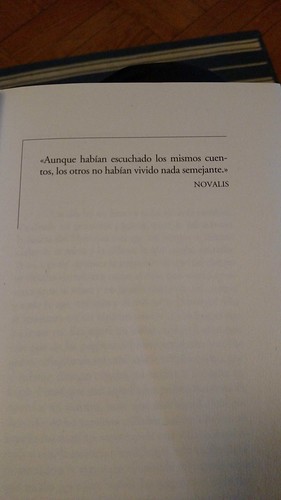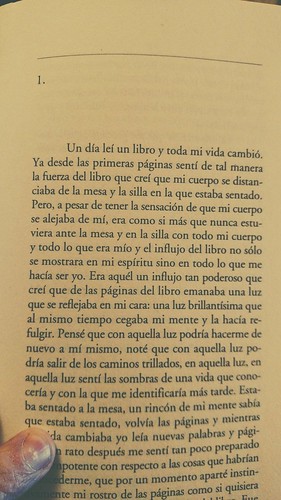|
|
Thursday, March 15th, 2018

Pamuk takes his epigraph to The New Life from the first chapter of Novalis's Heinrich von Ofterdingen -- the passage in full,
Wo eigentlich nur der Fremde herkam? Keiner von uns hat je einen ähnlichen Menschen gesehn; doch weiß ich nicht, warum nur ich von seinen Reden so ergriffen worden bin; die andern haben ja das nämliche gehört, und keinem ist so etwas begegnet.
posted evening of March 15th, 2018: Respond
➳ More posts about The New Life
|  |
|
Wow-- if my reactions to the initial few paragraphs of this book are any indication, I'm going to find rereading Pamuk in Spanish revelatory.

 The translation is by Rafael Carpintero, who I reckon is the main translator of Pamuk into Spanish -- I previously ran across his essay on Pamuk as "Un autor en busca de tres traductores", though that was before I could read Spanish, while I was reading My Name is Red. The essay is on page 83-85 of Vasos Comunicantes #36.
posted evening of March 15th, 2018: Respond
➳ More posts about Orhan Pamuk
|  |
Monday, March 12th, 2018
Fathom Events is going to be screening several Studio Ghibli movies in selected theaters in the US this year! Event page is here: Studio Ghibli Fest -- you can enter your zip code to find theaters near you. Looking forward to The Cat Returns next month in East Hanover!
posted evening of March 12th, 2018: Respond
➳ More posts about The Movies
|  |
Saturday, March 10th, 2018
...[I]n the first place, do
you think that such as these see anything of themselves, or of
one another, but the shadows formed by the fire, falling on the
opposite part of the cave? How can they, said he, if through
the whole of life they be under a necessity, at least, of having
their heads unmoved? But what do they see of the things that
are carried by? Is it not the very same? Why not? If then they were able to converse with one another, do not you think
they would deem it proper to give names to those very things
which they saw before them? Of necessity they must. And
what if the opposite part of this prison had an echo, when any
of those who passed along spake, do you imagine they would
reckon that whatever spake was anything else than the passing
shadow? I do not, said he. Such as these then, said I, will
entirely judge that there is nothing true but the shadows of
utensils.
posted morning of March 10th, 2018: Respond
|  |
Wondering why the Italian translation of Pamuk's The New Life is titled La Nuova Vita instead of La Vita Nuova... If both are correct Italian it seems weird not to make the reference explicit. Maybe Dante's word order is archaic?
posted morning of March 10th, 2018: Respond
➳ More posts about Readings
|  |
Thursday, March 8th, 2018
Intriguing... I had a few questions about the translations in "La Vita Nuova", so I ordered a copy of the original to do comparisons. And while searching around abebooks, happened on a copy of "Una Paragrafo Inedito della Vita Nuova, trovato fra carte del sec. XIII" (An unpublished paragraph from La Vita Nuova, found among papers from the 13th C.) by Giovanni Federzoni. Wild! It seems to be untranslated, and I'm finding precious little information about it online. Federzoni does not even have an entry in Italian Wikipedia, though his son Luigi has. The Treccani Dizionario Biografico confirms my hunch that the "unpublished paragraph" is an invention of Federzoni's. How Borgesian!
posted afternoon of March 8th, 2018: Respond
|  |
Wednesday, March 7th, 2018
In the book of my memory, after the first pages, which are almost blank, there is a section headed, "And then the murders began."
posted evening of March 7th, 2018: Respond
|  |
|
I'm thinking of an old post by Tyler Cowen at Marginal Revolution, which asserts that key to understanding Pamuk's The New Life is understanding Dante and how Dante used themes from Islamic writings in *his* La Vita Nuova. I've started reading Dante as I begin to think about rereading Pamuk. The translator's (Barbara Reynolds') introduction was not of much help in regards to figuring out Islamic sources for the work... I'm figuring one reference is to Majnun and Layla, with Dante casting himself as Majnun, approaching divinity by losing his wits over Beatrice. (The allegory doesn't really work for me, it seems kind of silly... Also Dante has twisted it around by portraying Love as a rational voice that tries to counter his mania. I guess he's attributing the mania to something like infatuation?)
 No, not infatuation, definitely Love -- see e.g.
And when I perceived her, all my senses were overpowered by the great lordship that Love obtained, finding himself so near unto that most gracious being, until nothing but the spirits of sight remained to me. But Love is also portrayed as talking him down...
posted evening of March 7th, 2018: 2 responses
➳ More posts about Sufi Epics
|  |
Sunday, February 25th, 2018
Hey look at that! I translated a rhyming, metered poem, and preserved the rhyme and meter! Not sure that has ever happened before. Goethe inscribed this poem in a book given to his daughter (according to Blumenberg, the book was Johnson's Dictionary) --

My translation--
The books are thick! and full of stuff!
I'm never going to learn enough!
If it won't come in my head,
I'll leave it in the book instead.
 (Note -- found this poem while reading Blumenberg's Care Crossing the River.)
posted evening of February 25th, 2018: 1 response
➳ More posts about Translation
|  |
Saturday, February 24th, 2018
None could comprehend the light of his face
The sun next to him a handful of clay
His mouth's essence was mysterious Lahut
His every vow a mirage of Nasut
--Love and Beauty (509-10)
The glossary at the back of the book identifies Nasut and Lahut as "ontological levels," respectively, of the human and the divine. Here's some of what Hazrat Inayet Khan had to say about it:

In Sufi terms, there are five stages of consciousness: Nasut, Malakut, Jabarut, Lahut, Hahut.
1. Nasut
This is the consciousness dependent on our senses. Whatever we see by means of the eye, or hear by means of the ear, whatever we smell and taste, all these experiences which we gain by the help of the material body prove to us that this is a particular plane of consciousness, or a particular kind of experience of consciousness. We call it "nasut."
2. Malakut
This is a further stage of consciousness, working through our mental plane. By means of this higher consciousness we experience thought and imagination, which are beyond our senses. ...
3. Jabarut
Here the experience is like that of a person in deep, dreamless sleep. He is said to be 'sound asleep.'
[...]
4. Lahut
This is a still further experience of consciousness. It raises a person from the material plane to the immaterial plane. In this plane the state of being fast asleep is not necessary. There is a greater peace and joy and nearness to the essence which is called divine. In Christian terms, this stage is called 'communion.' In the Vedantic terms it is called Turiyavastha.
5. Hahut
The further step to this is called 'samadhi,' which may no doubt be described as 'merging into God.' In other words, in this stage we dive into our deepest self-hood, God is in our deepest self. Here there is the ability to dive so deeply as to touch our deepest being, which is the home of all intelligence, life, peace, and joy; and here worry, fear, disease or death do not enter.
[...]
↻...done
posted morning of February 24th, 2018: Respond
| Previous posts
Archives  | |
|
Drop me a line! or, sign my Guestbook.
•
Check out Ellen's writing at Patch.com.
| |


















